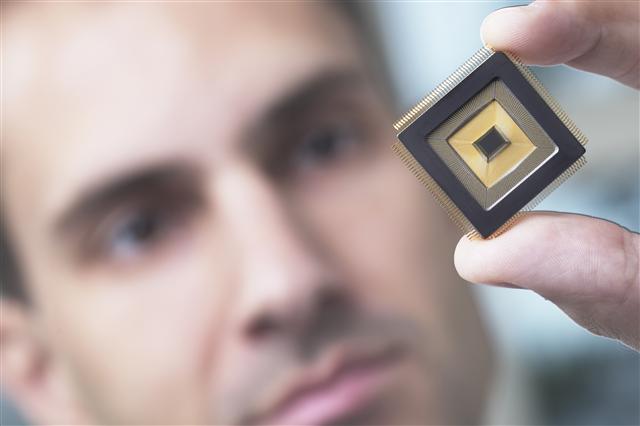
Royal Philips Electronics has announced development of a digital silicon photomultiplier technology that will allow faster and more accurate photon (the basic quantum unit of light) counting in a wide range of applications where ultra-low light levels need to be measured.
Areas where the new technology could have a major impact include medical imaging, in particular positron emission tomography (PET), and in-vitro diagnostic tests such as DNA sequencing and protein/DNA microarrays, the company said. Other relevant areas include high-energy physics, night-vision systems and other applications that currently use light detectors that are based on so-called photomultiplier tubes.

Samsung HKMG DDR5
Samsung Electronics has expanded its DDR5 DRAM memory portfolio with a 512GB DDR5 module...
Photo: Company

Nvidia GeForce RTX 30 series GPUs
Nvidia's GeForce RTX 30 series GPUs are powered by the company's Ampere architecture. The...
Photo: Company

Apple HomePod mini
Apple's HomePod mini is the newest addition to the HomePod family. At just 3.3 inches tall,...
Photo: Company

Apple 13-inch MacBook Pro with Magic Keyboard
Apple has updated the 13-inch MacBook Pro with the new Magic Keyboard for an improved typing...
Photo: Company

Apple iPad Pros
Apple's new iPad Pros comes with the latest A12Z Bionic chip, an ultra-wide camera, studio-quality...
Photo: Company
- Musk says chip capacity will decide winner of AI race (Mar 21) - EE Times
- Google taps MediaTek for cheaper AI chips (Mar 17) - The Information
- European project gets $260 million for HPC chip sovereignty (Mar 6) - EE Times
- The trouble with MAGA's chipmaking dreams (Mar 3) - Economist
- Automotive chips: Gloom and doom or boom by 2030? (Feb 14) - EE Times
- Deepseek is more Wall Street than Silicon Valley (Feb 3) - Culpium, by Tim Culpan
- Tech CEOs try to reassure Wall Street after DeepSeek shock (Jan 30) - Wall Street Journal
- TSMC to make chips for cryptominer Bitdeer at new US fab (Jan 17) - Culpium, by Tim Culpan
![]() Exclusive interview: Superb timing on the release of 'A Chip Odyssey'
Exclusive interview: Superb timing on the release of 'A Chip Odyssey'Unlike semiconductor manufacturing processes, time is never an element that filmmakers can control...
![]() 3Q25 outlook
3Q25 outlookThis is likely due to the uncertainty caused by the US's ever-changing tariff policies, its ongoing trade conflict with China, and a rather volatile...

South Korea panel maker business status
South Korea's two major panel makers have made progress in restructuring their businesses and will continue to strengthen OLED...

Trump reciprocal tariff impact on global industries
US President Donald Trump's implementation of reciprocal tariffs marked a significant shift in global trade dynamics and despite...

Global server supply chain status and analysis, 2023-2025
DIGITIMES conducted a thorough investigation of major Taiwanese and Chinese EMS providers' production sites, analyzing over...






